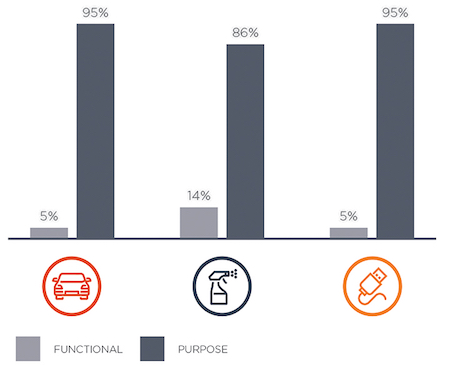Brands that address social issues and communicate a sense of purpose that reflects consumers’ values build deeper bonds and even provoke physical and emotional responses among audiences, according to a joint study released by Boston-based agency Cone and global PR powerhouse Porter Novelli.
The first-of-its-kind national study utilized biometrics research technology, enlisting respondents to wear a series of sensors that measured facial, heart rate and skin conductance impulses while viewing randomized sets of advertisements from various brands across varying industries, in an effort to understand consumers’ subconscious emotional reactions to purpose-driven messages.
The study found that purpose-driven advertisements outperformed ads that merely showcased functional attributes in two-out-of-three brand categories tested, drawing higher levels of attention, emotion and arousal from viewers.
 When asked which advertisement left viewers feeling a stronger emotional connection to a brand, participants in a biometrics study reacted overwhelmingly more positive to purpose-driven messages than ads that merely explain the functional attributes of the product (from L to R: automotive brands, household cleaning brands, and technology brands). When asked which advertisement left viewers feeling a stronger emotional connection to a brand, participants in a biometrics study reacted overwhelmingly more positive to purpose-driven messages than ads that merely explain the functional attributes of the product (from L to R: automotive brands, household cleaning brands, and technology brands). |
According to the study, “When focusing on the specific moment when the advertisements’ narrators delivered on the goal of each advertisement, either sharing the product attribute message or Purpose-driven message, it was revealed that the Purpose narrative outperformed among all three advertisement sets — with increased attention and arousal and, in cases, more positive emotion. In comparison, when the narrator began to explain the functional attributes of the product, attention wavered, arousal often decreased and, in one instance, respondents felt a negative emotion bordering on annoyance.”
When asked which advertisement made them feel better about a brand, respondents overwhelmingly chose the purpose-based ad over its functional counterpart (95 percent to 5 percent for technology brands; 95 percent to 5 percent for household cleaning brands; and 86 percent to 14 percent for automotive brands). When asked which advertisement inspired more trust, purpose led in two industries (86 percent to 14 percent for technology brands; 81 percent to 19 percent for household cleaning brands) while functional won out for automotive brands (52 percent to 48 percent). When asked which advertisement left viewers feeling a stronger emotional connection to the brand, purpose gauged the biggest wins of all (95 percent to 5 percent for technology brands; 86 percent to 14 percent for technology brands; and 95 percent to 5 percent for technology brands).
After viewing the purpose-driven advertisements, respondents additionally said they’d be more likely to discuss those ads and the brands with friends and family as well as share the ads on social media.
A followup national survey conducted as part of the study found that 86 percent of respondents said they’re more likely to trust companies that lead with purpose and 83 percent said they’d be more loyal to such companies. Additionally, 86 percent said they’d be more inclined to purchase products or services from purpose-driven companies, while 81 percent say they’d support those companies in their community. Nearly three-quarters (72 percent) said they think purpose-driven companies care more about them and their families.
Finally, the study found that more than three-quarters (79 percent) of Americans express feeling a deeper personal connection to companies with values similar to their own, and 76 percent believe supporting companies that address social and environmental issues helps them feel they’re doing their part. Additionally, 86 percent of respondents believe companies should support causes that impact or are impacted by that business, such as the environment or human rights, and 75 percent said they want companies to take a stand on issues that are widely discussed in the news and in society, such as immigration or equal rights.
The 2019 Porter Novelli/Cone Purpose Biometrics Study surveyed a random sample of 1,000 U.S. adults online in late March utilizing an online survey panel. 21 American adults additionally participated in biometrics research conducted by HCD Research. Those respondents were also asked to fill out a survey regarding the testing stimuli in an effort to gain insight into their conscious reactions.
Cone and Porter Novelli are both part of Omnicom.


 Consumers continue to place a premium on corporate responsibility, but they increasingly want to see that responsibility directed toward issues that affect the bottom line, according to a new study from Mission North
Consumers continue to place a premium on corporate responsibility, but they increasingly want to see that responsibility directed toward issues that affect the bottom line, according to a new study from Mission North Not all pressing issues require corporate voice! Brand stewards must must ask why and when their brands should engage, or if they need to engage on a particular issue at all.
Not all pressing issues require corporate voice! Brand stewards must must ask why and when their brands should engage, or if they need to engage on a particular issue at all. Dollar General investors voted in support of a shareholder resolution at its May 31 annual meeting for an independent third party audit of “worker safety and well-being.”
Dollar General investors voted in support of a shareholder resolution at its May 31 annual meeting for an independent third party audit of “worker safety and well-being.” Nonprofits and philanthropists have a unique opportunity to take ownership of conversations surrounding pressing social issues.
Nonprofits and philanthropists have a unique opportunity to take ownership of conversations surrounding pressing social issues.


 Have a comment? Send it to
Have a comment? Send it to 
No comments have been submitted for this story yet.